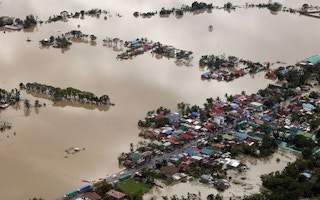A new bill that seeks to penalise companies that emit greenhouse gases above the allowable level is being proposed by members of congress who attended the Conference of Parties (COP27) in Sharm El Sheik, Egypt last week.
To continue reading, subscribe to Eco‑Business.
There's something for everyone. We offer a range of subscription plans.
- Access our stories and receive our Insights Weekly newsletter with the free EB Member plan.
- Unlock unlimited access to our content and archive with EB Circle.
- Publish your content with EB Premium.
The climate accountability bill seeks to establish a reporting facility for greenhouse gas emissions of businesses, where those who go beyond safe levels are fined. Studies estimate the safe level of greenhouse gas concentrations to be between 350 parts per million of carbon dioxide (ppm) and 400 ppm. The penalties will go towards a special fund for financing the claims for loss and damage of affected communities.
“This proposed legislation, perhaps the first of its kind in the world, seeks to institute policies and systems to address climate change, establishing the necessary institutional mechanisms for the protection of most vulnerable communities to loss and damage in the country,” said Edgar Chatto, chair of the house committee on climate change, in a privilege speech on loss and damage and the accountability of fossil fuel companies.
“With this contribution, it is my hope that instead of being known as the number one most vulnerable people, Filipinos will instead be recognised as being the first to translate into law our resolute call for climate justice.”
“
We need a loss- and damage-focused national legal framework to establish a specific-climate action track in addition to adaptation and mitigation.
Virginia Benosa-Llorin, senior campaigner for climate justice and liability campaign, Greenpeace Southeast Asia, Philippines
Crafting a national law for loss and damage is crucial in the demand for reparation at the international climate negotiations, said Virginia Benosa-Llorin, senior campaigner for climate justice and liability campaign, Greenpeace Southeast Asia, Philippines.
“The vulnerability of the Philippines and other poor nations highlights the importance of climate justice. Rich nations and corporations must take responsibility for the adverse impacts of climate change. We need a loss- and damage-focused national legal framework to establish a specific-climate action track in addition to adaptation and mitigation,” said Llorin, who represented Greenpeace as an observer at the Egyptian talks.
Although there are existing climate change laws in the Philippines, they are “insufficient”, she added.
She explained that the Climate Change Act, which recognises the need to mainstream climate change into government policies, is not enough to address climate loss and damage.
Moreover, the People’s Survival Fund, which provides long-term finance flows for adaptation projects of local governments and local organisations, does not mandate an accountability regime, she said.
The proposal for the new climate accountability bill is timely as it coincides with a warning issued by international lawyers to Philippines corporate directors on Monday to consider climate change risks. Failure to do so can result in legal action for their companies and themselves.
The warning was published in a new legal opinion by a team of independent legal counsel, titled Directors’ duties and responsibilities and disclosure obligations under Philippine Law on climate change risks. A legal opinion is an opinion from lawyers issued in letter form expressing legal conclusions on a matter.
Commissioned by the Commonwealth Climate and Law Initiative (CCLI), the legal opinion’s key aim was to examine the legal basis for directors and trustees to take account of climate change risks and disclose them.
The document’s conclusion was that because climate change poses both physical and transitional risks to companies, directors should understand business activities that may impact or be impacted by climate change, and take necessary action to address these issues.
In reponse to this legal opinion, Carlos Gatmaitan, chief executive officer of the Institute of Corporate Directors, Philippines, said that he expected that sustainability reports, in which environmental, social, and governance (ESG) data is tracked and disclosed, will be here for the “long term”.
He says the “essential” task for now is to move towards a “global standard” for sustainability reporting.

















